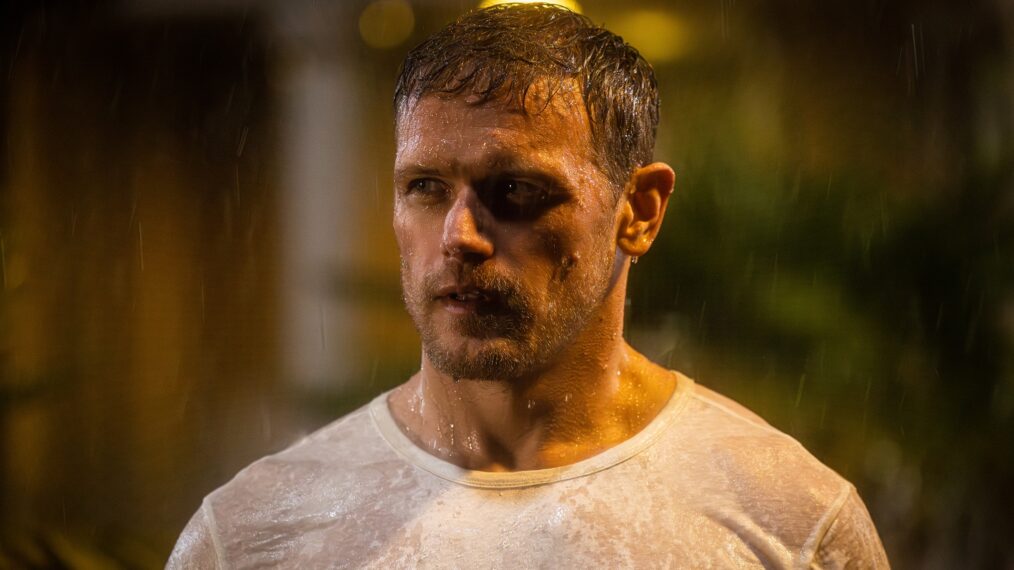The return of Callie Adams-Foster makes everything better.
Dare we say it, but Good Trouble Season 5 Episode 16 felt the most like a vintage installment for this series in quite some time and tapped into the Good Trouble nostalgia and endearing vibe of Good Trouble Season 1.
Callie’s return felt as well-placed as Isabella’s, and all of the plot points of the hour were compelling and moved things forward.
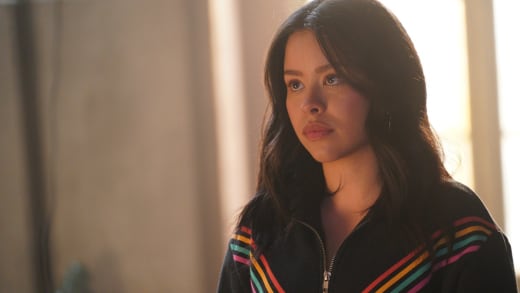
From the performances and pacing to the subject matter and character focus, “One Way or Another” was one of the strongest hours of Good Trouble Season 5, combining the season’s darker tones with some of the compelling approaches to life’s issues that were so prominent for the series in its prime.
There wasn’t a single miss with storylines during this hour.
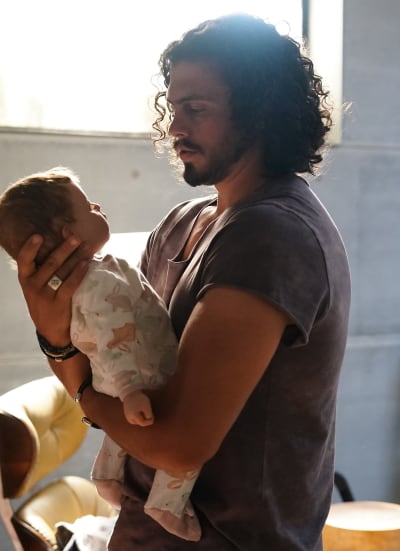
The series still remembers Lyric, and instead of using her as Gael’s wingbaby regarding his growing attraction and budding potential relationship with Jay, they touched upon the family dynamics.
We were due for some updates on this family situation. We had a lovely reprieve from Isabella and her, at times, exhausting storyline.
As a result, it wasn’t quite as daunting when she popped back up in Gael’s life to update him on what he’s been going through and make a gentle request to see her daughter.
As lovely as Priscilla Quintana, and she truly is a gem, the initial reaction to Isabella sitting across from Gael was one of dread.

No one wants to see a cliched approach of a mother who abandoned her child coming back into the fold with demands and a desire not only to see their child but potentially make a bid for some form of custody.
Fortunately, that was different from the approach Good Trouble made. It was refreshing and also served as a reminder of how this series, much like its predecessor, has always championed the beauty of unorthodox families.
Isabella: Giving her up was the hardest thing I’ve ever had to do.
Gael: I know.
Isabella: I’m sorry for taking her when I got scared, and for that emotional rollercoaster I put you through when we were together. You were always so kind and patient with me.
It’s good to hear that Isabella is doing so well. She’s undergone an extensive therapy session to help her unpack some of her issues regarding her parents and how her relationship with them has impacted her life.
She has not one but two stable jobs, and she genuinely seems happy. Even her approach to Gael Martinez about seeing their daughter was with caution and consideration.

She understands what she gave up and that her desires may not come to fruition, which she’d have to accept.
Or, maybe I’m as naive as Gael and deserve a reality check from my name sister as well.
Gael, I love you, but sometimes you are so naive. Always willing to give everyone the benefit of the doubt, even when they don’t deserve it. You know what? You’re the one who always gets screwed over.
Jazmin
It was a perfectly reasonable way of reintroducing Isabella without detracting from everything else, and it was handled well as there was a time when the focus on her character was too overwhelming.
For now, I can believe that Isabella’s intentions are pure, and she doesn’t have any desire to screw up an already difficult and strenuous adoption process for Jazmin and Spencer.

My heart ached for this couple with each ignorant comment or question lobbed at them by the social worker. Microaggressive language is a bitch, yes, the vulgarity intended, because the more the seemingly innocuous language builds, the more infuriating it gets.
Essentially, those comments are like tiny cuts. By the time the conversation is over, you’ve experienced a cluster of them in rapid succession, and while they’re small and appear relatively harmless, in abundance, they hurt and take their toll.
Related: 13 Most Positive Portrayals of Transgender People on TV
The guy was relentless and not hiding his morbid curiosity, ignorance, and judgment about Jazmin, her transgender identity, and her marriage.
Pretty early on, most of his questions had little to do with whether or not they’d be great parents and everything to do with simultaneously unpacking his curiosity about transgender people and relationships while projecting his impression and ignorance about them onto Jazmin and Spencer.
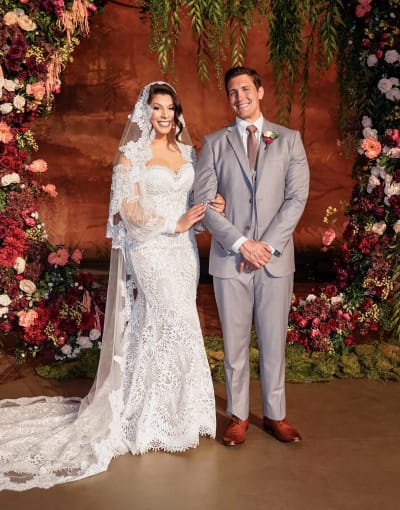
He was talking to Jazmin as if she was a lab experiment, and his shock that Spencer’s family accepted Jazmin and their marriage without judgment was so pronounced that it showed his hand.
Spencer is such an underrated character. He tends to play the supportive role of a supporting character like Jazmin and doesn’t have many scenes or even lines, but when he speaks and has moments, they’re so impactful.
Jazmin: I’m not trying to hurt you, but until the adoption is final, I can’t invite you to be a part of our family.
Isabella: I understand. Lyric is so lucky to have you as her mom.
He’s so cool, calm, and collected in the face of adversity and ignorance, and his love for Jazmin is always boundless. He supports and doesn’t mind gently challenging her when it calls for it, too.
I loved how much of a united front they were in the face of such ignorance. It was incredibly admirable that they could establish boundaries and firmly and politely let this man know that they saw what he was doing and who he was while also focusing on the adoption, as that is what this is about.
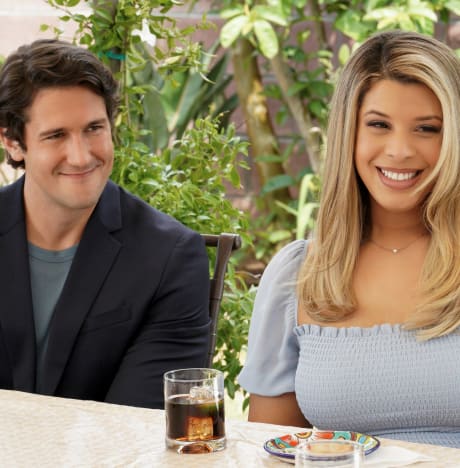
They exuded such grace, which was difficult knowing that they were at the mercy of this man, and, as Jazmin says, anti-trans laws are going into effect across the country every day.
It’s terrifying to speak up when it could come at such grave cost.
Related: These Shows are Successfully Commenting on Social Issues
In that sense, Jazmin’s feelings about Isabella and her swooping in with her desires to see Lyric were valid.
Undoubtedly, when the time is right, they’ll welcome Isabella into the fold and expand on their family. Spencer, for sure, is clear-headed, and I have no doubts that if Jazmin allows her fears to get in the way, he’ll pull her back in.
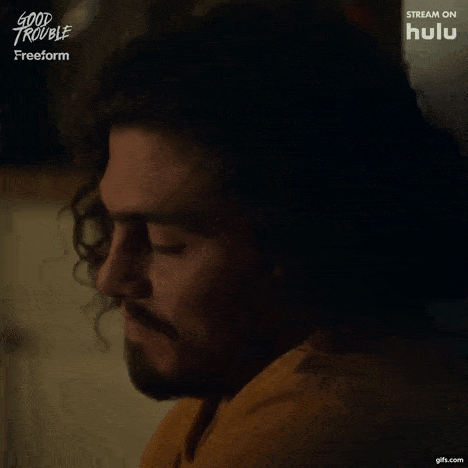
But if there’s even the slightest chance that Isabella’s presence could interfere with their already uphill battle of legally adopting Lyric, she should fall back for a bit.
Jazmin managed to advocate for herself well in explaining to Isabella how her request challenges and undermines her at a time when she’s having a hard enough time getting accepted as Lyric’s mother because she’s trans.
There were no “wrong sides” in this particular conflict, and that’s what I loved about this interaction and issue. It’s also where Good Trouble does better — when they showcase the genuine complexities of the hot-topic issues often at the forefront of discussions.
Jazmin’s position was perfectly reasonable, and so was Isabella’s desire to see her child now that she was in better standing. I am actually rooting for her to be able to experience Lyric without all the darkness of post-partum depression.
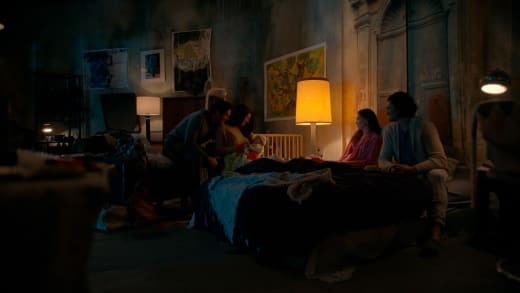
Lyric doesn’t belong to her, as she has found a happy, loving, stable home with Jazmin and Spencer. Jazmin and Spencer are Lyric’s primary parents, which should be that way. Nothing should undermine their parenthood, including Isabella and Gael.
But as long as Isabella doesn’t cross any lines in this regard, a couple of visits won’t hurt. Boundaries are essential here.
Related: Good Trouble Review: It’s My Party, I can Die if I Want to
Jazmin’s words to her brother were almost everything that viewers probably yell at the screen often when it comes to Gael, and he needed that reality check.
And it’s something that he can take forward in his potential new romances and with other aspects of his life. It’s likely what will inspire him further with his art career.

It was sweet to see him bond a bit with Callie. It’s interesting that once you remove the sexual tension and heat between them, they really are more solid as friends.
Rolling into Alice’s storyline was another prime example of how Good Trouble can navigate timely and topical subject matter in compelling ways when it chooses to do so.
Alice and Morty bonding over the queer experience, even generations apart, is the type of arc I envisioned when the series opted to explore the cross-generational friendship and dynamic by introducing that trio.
We could’ve had more of this and less of ferret jokes.
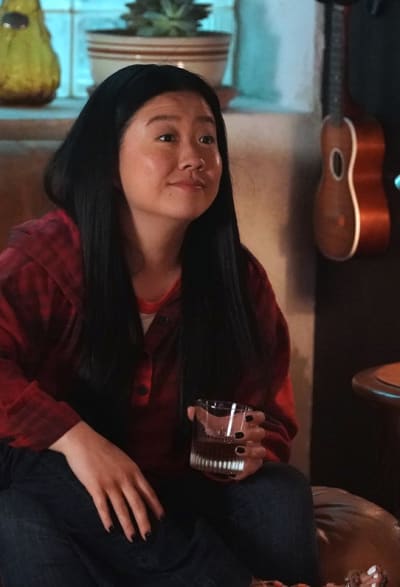
This storyline put Alice Kwan in her element and highlighted her at her best as a supportive, encouraging, and genuinely loving friend.
It’s fascinating and true to life to explore the generational switch-up of Morty turning to her and being inspired by her as an out loud and proud queer person.
Alice: Are you saying you’re bi-curious?
Morty: I guess technically, yes. But if I’m honest with myself, I’ve always been gay.
Alice: But you’ve been married three times.
Morty: Yeah, what can I say? I’m not a quitter.
We never stop learning as we get older, and there are many things that older generations can admire and seek guidance from those younger people. It was beautiful to see Morty let his guard down with Alice about his identity.
It’s still no cakewalk now for many queer people, things may have gotten significantly better in some regard, but there’s still an uphill battle and fight for rights and simple recognition as freaking human beings with worth.
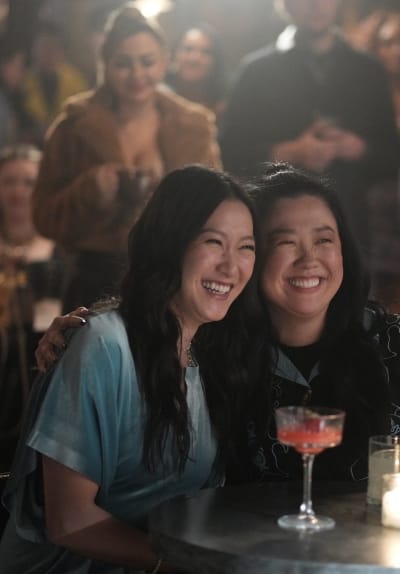
But one can understand Morty’s perspective as a Boomer who came up when times were significantly different. He still comes from an era when people didn’t proudly pronounce they were queer in a social media bio, don flags, and casually announce their pronounces without batting an eye.
It’s both humorous and heartbreaking to know that he’s been married three times and even shared a wife with one of the others. He did this, not as a bisexual or bicurious man but as a closeted gay man who was still afraid to come out and fully accept things, even for himself.
Related: Good Trouble Review: Party of One
It’s the most compelling storyline they’ve explored with Morty and the guys, and I wish we had these types of things much sooner.
Alice and Sumi thrust (pardon the pun) Morty headfirst into the gay club scene, and his wonder, excitement, and the plethora of emotions he went through and conveyed while there was pure entertainment and touching at once.
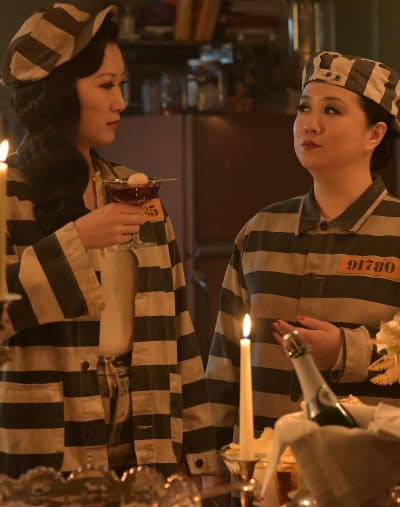
Goodness, you rooted for him so much. He brought you to a fit of laughter, undressing to make himself look less stuffy and stuffing cash into the dancer’s undies. And then he brought you to tears when he ran out of there, overwhelmed and fearful, and had that beautiful conversation with Alice in the car.
And, of course, you couldn’t stave off the mix of pride and heartbreak for him when he finally announced to the guys that he was gay, and Maury left.
One can only hope that Maury needs time to process or that he’s potentially upset that his best friend was struggling with this secret and didn’t tell him.
But it’s sadly not uncommon for loved ones to not be as supportive as one hopes, so it could go either way. I’m rooting for the best here.
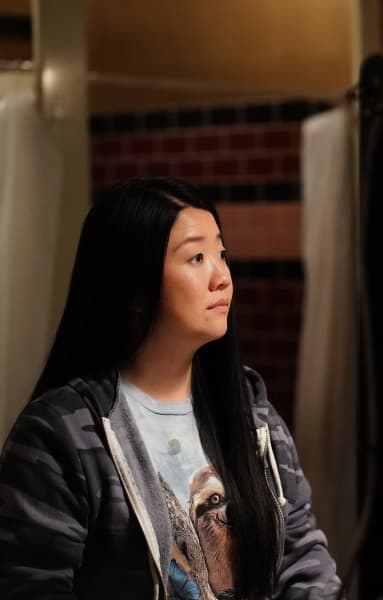
It’s the best arc they’ve produced with these characters, and it bugs me that they were so misused all this time.
It’s the first time I’ve been genuinely invested in this entire arc.
Related: The Way Home Review: When We Were Young
Morty deserves to be happy, find love and companionship with a lovely man who can appreciate him, and the support of those closest to him since they’re at an age where they can’t waste time on anger, strife, or anything akin to it.
And I was so proud of Alice as we know she’s spent this entire series navigating some ups and downs in her journey as an out and proud queer woman.
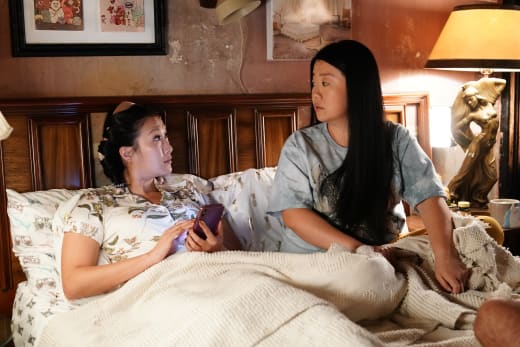
She hasn’t had an easy path, particularly with the intersectionality components for her as a queer, Asian-American woman.
It felt good to see her in the role of the person who could confidently reach that hand back and help another queer person through their journey to acceptance.
Regardless of how underwhelming much of Alice’s arc with the writer’s room shenanigans has been, it has certainly highlighted her growth as a more confident, happier woman who can advocate for herself and make her dreams come true.
Even something as simple as Malika Williams returning to Douro to hang out with her friends put her back into her element a bit.
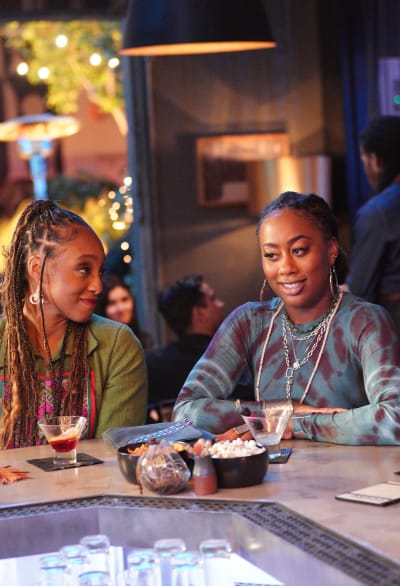
Rather than the traditional love triangle or rehashing the same one, she’s in a more complicated situation where she wants to be with Angelica, and someone would argue that she only wants to be with her. Still, she is also devoted to Isaac and wants to ensure he’s good.
There is something so subtly but peak “Black Woman Experience” about this situation, where she’s devoted to taking care of Isaac even when there’s no romantic potential there anymore, but desires Angelica.
Related: TV Couples Who Epitomize ‘Black Love’
She’s not going to turn her back on Isaac, and she’s willing to pour everything into taking care of this man because she loves and cares for him, but it can bump up against moving forward with Angelica.
To a degree, Angelica has been relatively understanding, even though she’s still trying to figure out the situation better.
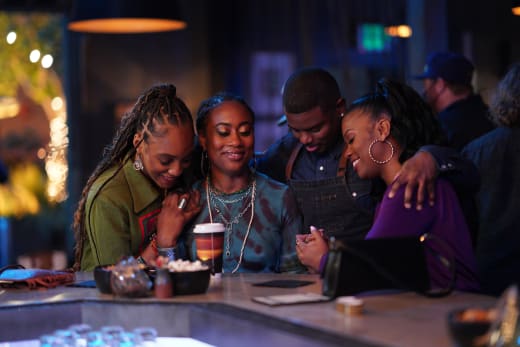
However, she also calls Malika out on giving in to an obstacle in their path, Isaac.
It’s a challenging situation, though, as I don’t foresee Isaac as a significant obstacle. In this instance, he’s the equivalent of the family that she’s tending to, and if that’s something that Angelica doesn’t feel she can fully comprehend, then maybe they shouldn’t be together.
Therein lies the series exploring the Black women’s penchant for being in caretaking roles, sometimes to their own detriment and expense, without feeling as if they’re being offensively stereotypical about it.
It’s a natural position for Malika to be in at the moment, and it presents some conflicts and realistic tension between her and other characters and poses some issues for her.
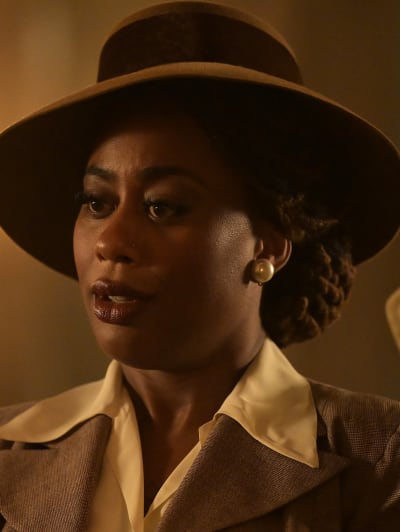
Thankfully, her friends are there to remind her that she must also look after herself in this Isaac situation, giving voice to the scenario before it gets problematic.
She’s trying to handle this situation as best as possible, not smothering Isaac or stepping on his toes and micromanaging him.
Related: Misunderstood Women: TV Characters Who Faced Unjust Criticism
But she’s also observant and knows that he’s also struggling.
She could understand that his mixing antidepressants and one beer would result in his intoxication. But it wasn’t until Mariana asked her about the missing antidepressants that it clicked that Isaac wasn’t going about this most healthily.
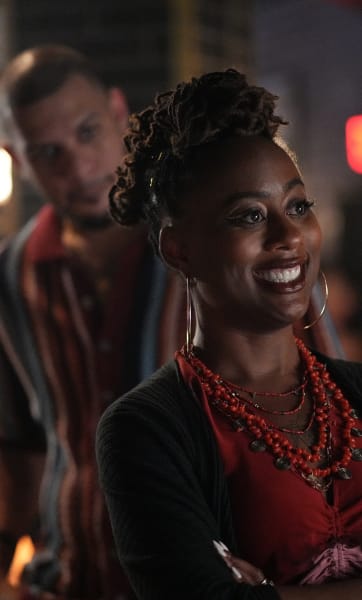
Now we have to wonder how she can approach him and if this reaches a point where she can’t physically help him himself, and he may need a professional.
Addiction is such a difficult issue to steer through with so many varying factors.
It wasn’t surprising that Mariana Adams Foster would need antidepressants after learning about Silas.
Is it going to sound redundant? Yes. It will.

But, dammit, can we take another moment to appreciate Cierra Ramirez and the performances she’s delivering this season? She’s so fantastic to watch.
As a longtime The Fosters fan since the series’ inception, it hits much harder seeing her performances now, with the subject matter she’s gotten as of late.
I can visibly see how much she’s evolved as an actress, and there’s this overwhelming sense of pride one experiences watching her, primarily through some of the more dramatic and emotional scenes.
She’s come such a long way as an actress. As disheartening as it is that the series is concluding, especially in this instance, as it’s essentially a decade of playing this role, I’m also excited to see what this talented woman does next.
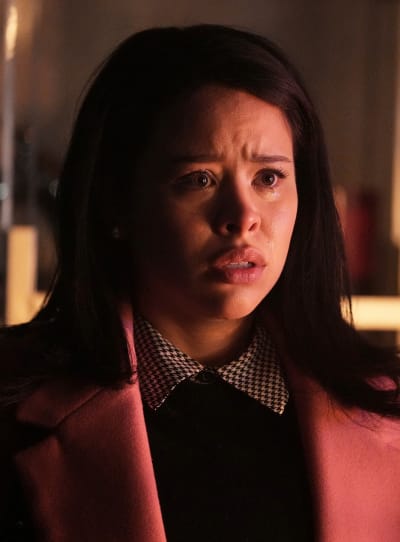
Callie could not return at a better time, and the opening scene was pure perfection. I loved Joaquin’s gentle approach to relaying the news about Silas.
I loved the blocking of that scene and the lighting as well. And then Callie interjecting before Mariana could even react with that fierce sisterly protectiveness and disbelief was wonderful.
Joaquin [to Mariana]: I need to tell you something. I have proof that Silas was here in the Coterie and in your loft.
Callie: Silas was here? In your loft.
Callie Adams Foster was a total badass during this installment, oozing all the confidence of a woman who has found stability in her life and is established in her career for once. Her wardrobe was fire!
The way she slid out of the car and sidled up to Silas with that restraining order and a suit that believed she meant business had me pumping my fist.
We didn’t have to catch up with Callie during this installment to feel that she was in a much better place in her life.
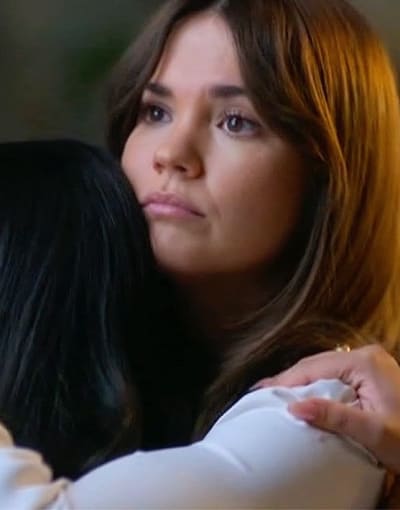
But she’s also hypocritical in the way that siblings can always be. Understandably, many of Callie’s warnings to Mariana are because she’s a woman who has done her fair share of risky, stupid things, too.
She wants to avoid Mariana going through the same things that she has and making careless mistakes.
But she also knows that neither she nor anyone can control her sister or dissuade her from making her own choices.
So it was frustrating to see Callie so hellbent on going after Joaquin, as if he dragged Mariana into this Silas mess when he’s spent most of this investigation trying to keep Mariana out of it.
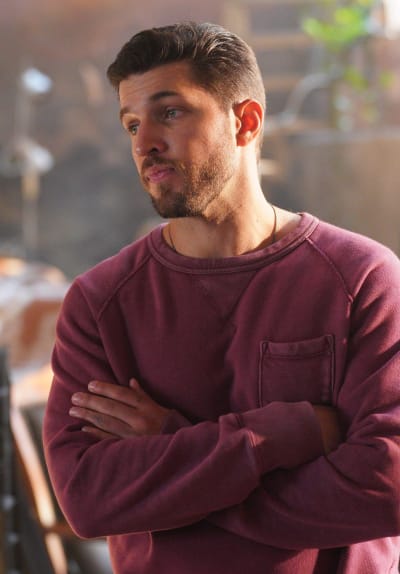
And Joaquin Perez is nothing if not intuitive, and regardless of how people feel about him or his relationship with Mariana, it’s always abundantly clear that he has her best interest at heart.
He’s particularly tried to keep her out of things once he saw the emotional and mental toll all of this has been taking on her, and no one has been able to check in with Mariana with success like Joaquin, sadly, even Callie.
Callie: Why do you keep roping my sister into these dangerous situations?
Joaquin: I can’t control her actions any more than you can.
Callie: You can keep your amateur detective business to yourself!
Mariana: Can you please stop talking about me like I’m not here? Silas was responsible for Evan getting shot. I couldn’t just stand by while he got away with it. He needs to be held accountable!
Callie was unfair to Joaquin in her approach to him and all the shade-throwing and snipes.
But it also doesn’t mean that it wasn’t entertaining to watch. Bitchy Callie can be such a force, and we don’t see it nearly as often as one would expect.
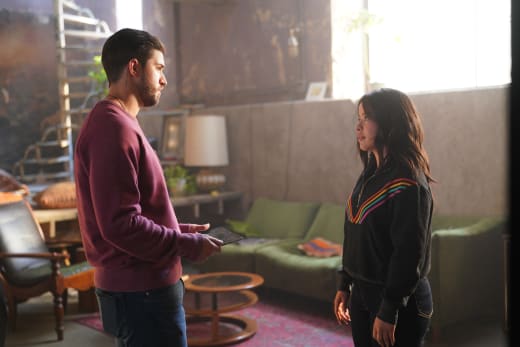
And Joaquin manages to take things in stride, which makes me appreciate and love him even more.
Evan interrupting the tense moment between the trio was such a delicious jolt of fresh water to the face. I appreciated how everyone looked properly chastised without a single word because of his presence.
Related: Chicago PD: Burzek’s Journey to Forever is a Testament of Enduring Love
He’s the one who has faced the ultimate repercussions from Silas and this situation, and he still isn’t back to how he used to be because of it.
Evan is the victim who’s still around enough for them to think about Silas and what he’s done.

The dramatic melancholic that overcame the scene when Evan asked if he had met Callie before and apologized for not remembering her was so good in the bleakest of ways.
And somehow, amid all this, they gave us more stolen Eviana moments that carried over Good Trouble Season 5 Episode 13.
Evan: So, who was that person you were talking about? The man responsible for me getting shot?
Mariana: Silas, the man who shot you, Adam, worked for him.
Evan: I don’t need you to avenge me, Mariana. Especially not with a man who seems so dangerous. You need to be safe. I need you to be safe… for the company and your family, and I never want to be responsible for any harm coming to you.
I held my breath when they spoke in her room, and he told her that he didn’t want her to avenge him. And when he said he needed her, you felt every intense emotion in that pause before he tried to play it off.
The slow moments of him watching her tuck her hair behind her ear — ripped from the romcom textbook, and the tension was so thick it was physically jolting when the spell broke and their moment was over.
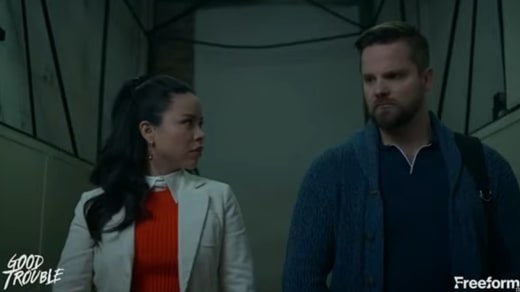
How they managed to recycle the Eviana slow burn like this is beyond me. It’s ludicrous that it consisted of a plot ripped right from a telenovela, but damn if it didn’t work!
Evan is coming to grips with the fact that he has fallen for Mariana all over again, all anew.
Related: 73 Couples We’ll Hapilly Go to Hell Shipping
It makes them feel inevitable, doesn’t it? As if, regardless of the situation or different trajectories in life, their love is somehow fated.
And he cares about her enough not to want her to put her life at risk to avenge him. After all, he almost died trying to protect her and save her life before.
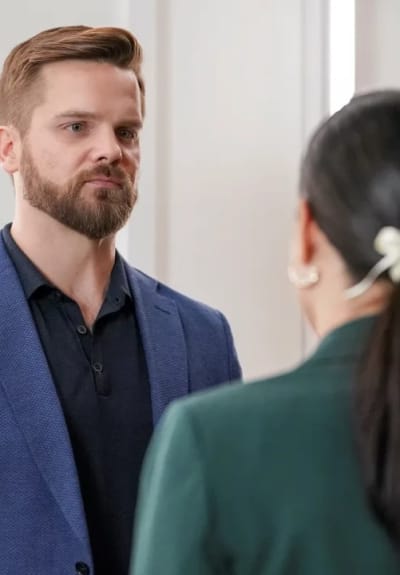
If she endangered it again, it would logically mean what he did was for nothing.
On the surface, one would understand why some think it’s unfavorable that Mariana is risking everything “for a man.” But who wouldn’t draw blood and fight fire for the people they love?
Silas came into my room. He violated my space. He tried to scare me and intimidate me. I’m not trying to avenge Evan anymore. Now, I’m avenging myself.
Mariana
Isn’t that what Callie is doing with Mariana? Isn’t that what Joaquin is doing with Mariana and Jenna? Why wouldn’t she want to avenge Evan?
But Mariana is also correct in that Silas has violated her space. He’s crossed lines in despicable ways and wanted to make her feel unsettled in her own home.
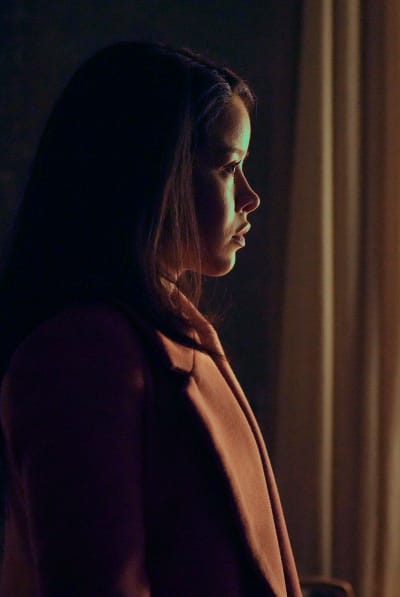
You cannot let someone violate you like that without consequence, and Silas continuously evades them. As reckless as it is, Mariana’s desire to stay on his neck and take him down plays into our baser instincts as humans.
She’s fled and froze, but she’s angry enough now that she wants to fight, and I cannot judge her too harshly for that.
Related: Powerful TV Proves We Need Black History Month Now More than Ever
But goodness, this also means this investigation will be around for a while.
Callie delivered that restraining order, the only thing she could pull off in this situation, as there wasn’t enough evidence for anything else.
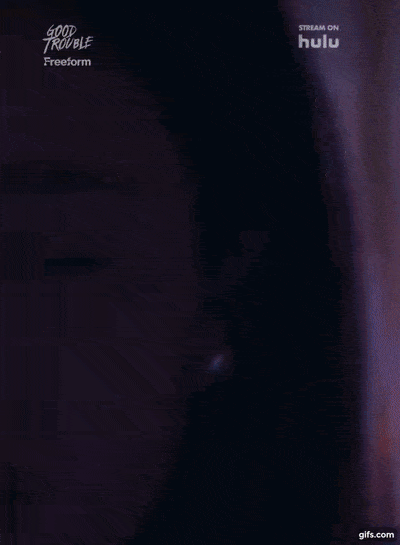
But Mariana and Joaquin won’t stop looking into Silas and trying to take him down. Silas isn’t the sort to back down and takes great pleasure in letting Mariana, and even Callie know that he knows everything about them.
Nothing about this can end well, or at least end without some blood drawn and some severe blows.
Mariana: This is my sister, Callie.
Evan: Have we met before?
Callie: Yes.
Evan: I’m sorry, I don’t remember.
Jenna may be a key to that. She’s starting to feel more and more like collateral damage.
Over to you, Good Trouble Fanatics. Did this installment feel like Good Trouble went back to its roots? Which storyline reeled you in the most? Let’s hear it below!
Good Trouble airs Tuesdays at 10/9c on Freeform. You can stream it the next day on Hulu.
Jasmine Blu is a senior staff writer for TV Fanatic. She is an insomniac who spends late nights and early mornings binge-watching way too many shows and binge-drinking way too much tea. Her eclectic taste makes her an unpredictable viewer with an appreciation for complex characters, diverse representation, dynamic duos, compelling stories, and guilty pleasures. You’ll definitely find her obsessively live-tweeting, waxing poetic, and chatting up fellow Fanatics and readers. Follow her on X.


























































![Mason Ramsey – Twang [Official Music Video] Mason Ramsey – Twang [Official Music Video]](https://i.ytimg.com/vi/xwe8F_AhLY0/maxresdefault.jpg)










